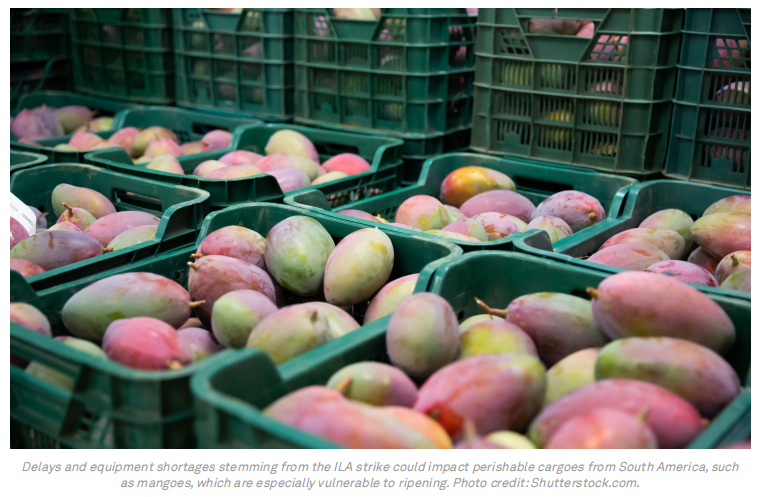
Oct 3, 2024 at 3:10 PM EDT
Refrigerated (reefer) container shippers using US East and Gulf coast ports are worried that if the International Longshoremen’s Association’s (ILA’s) strike continues for another week, they’ll be faced with equipment shortages and spoiling perishables, some of which are in their peak season. As the strike continues to affect several major US gateways for reefer cargo, such as Philadelphia and Wilmington, Del., the refrigerated container market is particularly at risk. Some shippers can still move goods via north-south services calling on non-unionized terminals, such as Seaboard in Miami, Gulf Stream inHouston, Penn in Philadelphia and Gloucester Terminal in New Jersey. Shifting South American exports to the West Coast remains a less-appealing option given the siloed nature of intermodal transit in South America and existing time constraints. Given the time-sensitive nature of the cargo and the growing queue of ships outside East and Gulf coast ports, the reefer market will reach its breaking point if the strike lasts more than a week, said Eric Brown, president at JTP Transportation and chair member of the Meat Import Council of America. The uncertainty around delivery dates and reefer equipment availability comes during the peak season for shipments of mangoes from South America, which Brown said are particularly vulnerable. “We’re right at the start of [Brazil’s] mango season, but the mangoes are aging,” he said. “When they come in, [importers are] going to want everything immediately, which is a nice idea, but they’re going to jam up the warehouses [and] the ports. The industry only has a certain number of wheels to put all these containers on, and warehouses only have so much manpower.” Still, mangoes are just one refrigerated commodity that shippers will be desperate to move when work resumes. Other fruits, such as grapes, blueberries and cherries generally land in the US in December and January. Ports that handle significant reefer volumes could be especially pressed when work resumes as shippers work to get their shipments off the boats and on to the shelves before their products expire. Brown said reefer containers that are reliant on gensets — i.e., diesel-powered generators — rather than plug-in electricity are at greater risk of spoilage because some gensets turn off after just a few days without intervention. Edison Escobar, director at cold-chain specialist Lineage Logistics, said Lineage pre-pulled as many of its customers’ containers as possible before marine terminals closed due to the strike. However, he said it’s likely some reefers remain inaccessible because they weren’t released in time or there was no truck available, in addition to those stuck on vessels outside the ports. “The lack of monitoring is a big concern,” Escobar told the Journal of Commerce. “Once we start pulling containers again, will there have been temperature deviations or spoilage? That’s a big unknown.”
Limited options
In the meantime, some shippers are utilizing terminals not affected by the strike to offload their reefer containers, such as Dole Ocean Cargo Express’ Gulfport, Miss., facility; Seaboard Marine’s terminal in Freeport, Texas; Crowley Maritime’s terminals in the Port of Jacksonville and Port Everglades; and the PSA Penn Terminal in Philadelphia, which serves the trans-Atlantic reefer trade. But other major container gateways for cold-chain shipments including Philadelphia and Wilmington, Del. remain closed, and that will affect the independent distributors such as Fyffes and One Banana, according to Bill Duggan, a principal at cold-chain consulting firm Eskesen Advisory. Brown said however long the ILA strike lasts, navigating the path to normal operations once it is over will be complex, especially for specialty cargo such as reefers, and the market reaction will take time to materialize. If ILA-served ports are slow to clear out the cargo when work resumes, vessel congestion could create a cascading logjam effect. Conversely, if the work is done too rapidly, there could be a surge in empty equipment tied up on the water, disrupting reefer positioning. Duggan said carriers need to start staging empty reefer containers in South America by December to handle the peak season, but for now, there appear to be no major container imbalances and cold-chain storage capacity is available. The resumption of operations could also bring additional costs for shippers. During the port strike, refrigerated shippers don’t have to worry about paying demurrage for reefers stuck inside terminals, as all operators have agreed to waive those fees. However, in the rush to remove containers once the terminals open, Escobar said that delays could push containers past their free time. Dry container trade in and out of Brazil has yet to see any impact from the ILA strike, but Marcelo Machado, sales consultant at CSS Logistics, said some ripple effects are inevitable. “Global logistics does not tolerate interruptions,” he said. “If the strike continues, there will be delays in deliveries, port congestion, and increased transportation costs.

